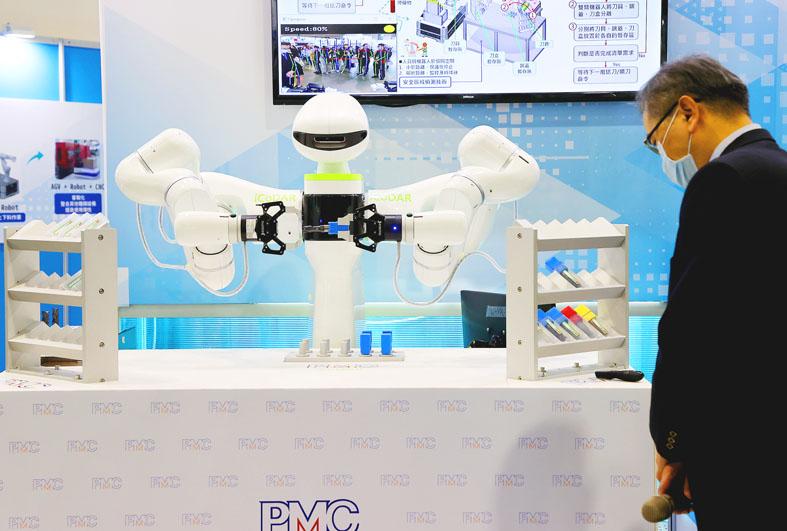The official manufacturing purchasing managers’ index (PMI) posted 59.3 this month, above the expansion threshold for 18 straight months, but increasing costs might weaken companies’ profitability next year, the Chung-Hua Institution for Economic Research (CIER, 中華經濟研究院) said yesterday.
The Taipei-based think tank said that its assessment is based on a month-long survey of local firms.
PMI readings aim to gauge the health of the manufacturing industry, with scores above 50 indicating expansion and scores below 50 suggesting a contraction.

Photo: CNA
The growth extended across all manufacturing sectors, as local companies benefited from the recovery of the global economy, the survey showed.
“Companies generally expect business to go uphill in the next six months, compared with the second half of this year, but voiced concern that rising labor and raw material costs would pressure profit margins,” CIER president Chang Chuang-chang (張傳章) said.
Raw material price upticks not only reflect demand pickup, but are due in part to supply chain bottlenecks, Chang said.
Lockdowns and other measures to contain the spread of COVID-19 affected delivery schedules, and pushed up shipping and commodity costs, he said.
The PMI’s sub-index on raw material prices remained high at 73.9, while the measure on delivery times stretched to 65, Chang said, adding that the predicament might persist through the first half of next year.
Some manufacturers can pass cost hikes to customers, while less competitive ones opt to absorb the burden to retain customers and shoulder thin margins, he said.
The survey showed lackluster profit expectations, at 47.4 for the first half of next year, even though the six-month outlook reading held solid at 57.9, unchanged from one month earlier, Chang said.
The Omicron variant of SARS-CoV-2 raises global uncertainty over when supply chain disruptions might end, Chang said, adding that inflation would remain a threat unless demand weakens due to other downside risks, including interventions by global central banks.
The sub-index on new business stood at a robust 59.7, while the measure on industrial production remained at a high level of 60.2, the survey showed.
Business improvement extended to non-manufacturing sectors, with the dedicated index at 58.6, rising for six months in a row, it showed.
All sectors took part in the recovery and growth is expected to continue in the coming six months, Chang said.
Private consumption might replace exports as the main growth driver for Taiwan’s economy next year, as a high comparison base would weigh on export increases, he said.

Semiconductor business between Taiwan and the US is a “win-win” model for both sides given the high level of complementarity, the government said yesterday responding to tariff threats from US President Donald Trump. Home to the world’s largest contract chipmaker, Taiwan Semiconductor Manufacturing Co (TSMC, 台積電), Taiwan is a key link in the global technology supply chain for companies such as Apple Inc and Nvidia Corp. Trump said on Monday he plans to impose tariffs on imported chips, pharmaceuticals and steel in an effort to get the producers to make them in the US. “Taiwan and the US semiconductor and other technology industries

SMALL AND EFFICIENT: The Chinese AI app’s initial success has spurred worries in the US that its tech giants’ massive AI spending needs re-evaluation, a market strategist said Chinese artificial intelligence (AI) start-up DeepSeek’s (深度求索) eponymous AI assistant rocketed to the top of Apple Inc’s iPhone download charts, stirring doubts in Silicon Valley about the strength of the US’ technological dominance. The app’s underlying AI model is widely seen as competitive with OpenAI and Meta Platforms Inc’s latest. Its claim that it cost much less to train and develop triggered share moves across Asia’s supply chain. Chinese tech firms linked to DeepSeek, such as Iflytek Co (科大訊飛), surged yesterday, while chipmaking tool makers like Advantest Corp slumped on the potential threat to demand for Nvidia Corp’s AI accelerators. US stock

The US Federal Reserve is expected to announce a pause in rate cuts on Wednesday, as policymakers look to continue tackling inflation under close and vocal scrutiny from US President Donald Trump. The Fed cut its key lending rate by a full percentage point in the final four months of last year and indicated it would move more cautiously going forward amid an uptick in inflation away from its long-term target of 2 percent. “I think they will do nothing, and I think they should do nothing,” Federal Reserve Bank of St Louis former president Jim Bullard said. “I think the

SUBSIDIES: The nominee for commerce secretary indicated the Trump administration wants to put its stamp on the plan, but not unravel it entirely US President Donald Trump’s pick to lead the agency in charge of a US$52 billion semiconductor subsidy program declined to give it unqualified support, raising questions about the disbursement of funds to companies like Intel Corp and Taiwan Semiconductor Manufacturing Co (台積電). “I can’t say that I can honor something I haven’t read,” Howard Lutnick, Trump’s nominee for commerce secretary, said of the binding CHIPS and Science Act awards in a confirmation hearing on Wednesday. “To the extent monies have been disbursed, I would commit to rigorously enforcing documents that have been signed by those companies to make sure we get